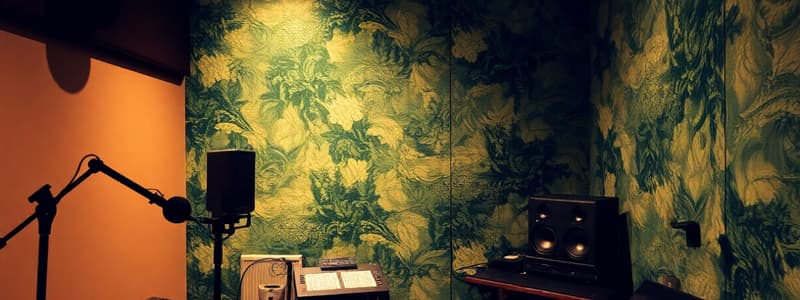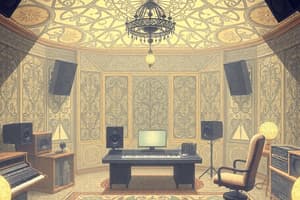Podcast
Questions and Answers
What is a primary advantage of a professional recording studio compared to a home studio?
What is a primary advantage of a professional recording studio compared to a home studio?
- DIY soundproofing
- Lower cost for setup
- Access to high-end equipment (correct)
- More flexibility in scheduling
Acoustic treatment in a professional studio is typically of lower quality than in a home studio.
Acoustic treatment in a professional studio is typically of lower quality than in a home studio.
False (B)
Match the following components with their descriptions:
Match the following components with their descriptions:
Studio/Live Room = Primary area where musicians perform Iso Booth = Used for recording individual instruments Control Room = Central area for operating recording equipment Sound Lock = Reduces sound transmission between rooms
Why is flexibility considered a benefit of home studios?
Why is flexibility considered a benefit of home studios?
Professional studios typically have scheduled sessions mainly on weekdays.
Professional studios typically have scheduled sessions mainly on weekdays.
What is the primary benefit of proper acoustic treatment in a recording environment?
What is the primary benefit of proper acoustic treatment in a recording environment?
Isolation techniques can help prevent sound from leaking into unwanted areas during a recording session.
Isolation techniques can help prevent sound from leaking into unwanted areas during a recording session.
Match the following systems with their primary function:
Match the following systems with their primary function:
What happens if audio signal flow is not properly managed?
What happens if audio signal flow is not properly managed?
AC connections are not vital for the proper functioning of recording equipment.
AC connections are not vital for the proper functioning of recording equipment.
Why would a musician require a custom headphone mix?
Why would a musician require a custom headphone mix?
Why is an isolation booth typically found in a recording studio?
Why is an isolation booth typically found in a recording studio?
Match the term with the correct definition by selecting one item from each side column.
Match the term with the correct definition by selecting one item from each side column.
Flashcards
Studio/Live Room
Studio/Live Room
The main space where musicians perform and are recorded, designed to capture the natural sound of instruments and vocals.
Iso Booth
Iso Booth
Small isolated rooms used for recording individual instruments, vocals, or other sound sources separately, preventing sound bleed to other areas.
Sound Lock
Sound Lock
A soundproof entryway with two doors, designed to minimize sound transmission between rooms, preserving acoustic integrity.
Control Room
Control Room
Signup and view all the flashcards
Acoustics
Acoustics
Signup and view all the flashcards
Acoustic Treatment
Acoustic Treatment
Signup and view all the flashcards
Cost Efficiency
Cost Efficiency
Signup and view all the flashcards
Equipment Quality
Equipment Quality
Signup and view all the flashcards
What are acoustics for recording?
What are acoustics for recording?
Signup and view all the flashcards
Why is isolation important in recording?
Why is isolation important in recording?
Signup and view all the flashcards
What does a headphone mixer do?
What does a headphone mixer do?
Signup and view all the flashcards
What is audio signal flow?
What is audio signal flow?
Signup and view all the flashcards
How do microphones affect signal flow?
How do microphones affect signal flow?
Signup and view all the flashcards
Why are headphone connections important in recording?
Why are headphone connections important in recording?
Signup and view all the flashcards
What is the importance of AC power in recording?
What is the importance of AC power in recording?
Signup and view all the flashcards
What is a talkback system?
What is a talkback system?
Signup and view all the flashcards
Study Notes
Recording Studio Fundamentals
- Recording studios are designed for capturing and producing high-quality audio.
- They differ from home recording setups in several key areas, including cost, equipment quality, acoustic treatment, flexibility, expert assistance, and sound quality.
Home Recording Studio vs. Professional Studio
- Cost Efficiency: Home studios have lower setup costs, while professional studios have higher hourly rates.
- Equipment Quality: Home studios are limited by personal budgets, while professional studios have access to high-end gear.
- Acoustic Treatment: Home studios often feature basic or DIY soundproofing, whereas professional studios have professionally designed acoustics.
- Flexibility: Home studios allow for work at one's own pace, while professional studios typically schedule sessions.
- Expert Assistance: Home studios rely on self-reliance or limited external help, while professional studios have access to experienced engineers, assistants, and managers.
- Sound Quality: Home studios may compromise on sound quality due to budget constraints, while professional studios offer superior audio due to their equipment and environment.
Studio/Live Room
- This is the primary area where musicians perform and recordings are made.
- It's crucial for capturing the live sound of instruments and vocals.
- Design considerations play a role in quality audio recording.
Isolation Booths
- Isolation booths (ISO booths) are used to record individual instruments or vocals separately.
- They help prevent sound leakage and interference from other sources.
- Isolation booths are useful in studio recording configurations to prevent unwanted sounds from mixing in.
Sound Locks
- Sound locks are entryways designed to reduce sound transmission between rooms.
- They maintain acoustic integrity for different spaces in the studio.
- Sound locks typically have at least two doors.
Control Room
- The control room is the central area where the audio engineer manipulates recording equipment.
- It houses the mixing console, monitors, and other essential devices for monitoring and adjusting recordings.
Importance of Acoustics
- Acoustics are important for accurately capturing and reproducing sound.
- Proper acoustic treatment controls reflections and reverberations.
- Acoustics play a vital role in achieving high-quality recordings.
Isolation Techniques
- Isolation methods are used to prevent unwelcome sound from unwanted areas.
- Techniques include soundproofing walls, isolation booths, and sound locks.
Function of Headphone Mixers
- Headphone mixers enable musicians to hear a customized mix of audio sources.
- They allow individual control of volume levels for various instruments/vocals.
- Musicians might require a customized headphone mix for proper monitoring.
Understanding Signal Flow
- Recording equipment signal flow is important for proper functioning.
- Signal flow involves understanding audio connections for various recording components.
- Understanding signal routing from microphones to headphones and other equipment matters.
Audio Connections for Mics
- Proper microphone connection setup is important for smooth audio transmission and monitoring.
- Microphones are connected to preamps or interfaces for sound capture.
- Different microphones affect signal flow and audio quality.
Audio Connections for Headphones
- Headphones are usually connected to headphone amplifiers to serve for monitoring.
- Ensure clarity for all performers during recordings.
- Take considerations for multiple performers using headphones.
Audio Connections and AC Power
- AC connections provide power for equipment like amplifiers and audio interfaces.
- Reliable and uninterrupted power is crucial for studio recording.
Multi-channel Headphone/Cue Systems
-
Essential for recording studios as they allow multiple performers to listen to different audio mixes at the same time.
-
Each channel can be customized by the engineer so that musicians receive personalized cues and monitoring levels, including a "more of me" channel.
-
By utilizing such systems, engineers can ensure that artists hear exactly what they need, thus minimizing complaints that a musician can't hear themself well.
Talkback System
- Talkback systems allow engineers to communicate with musicians in the recording area.
- Engineers use talkback for instructions and feedback during recording sessions.
Listen Mic System
- Listen mic systems help monitoring conversations in different areas of the studio.
- Ensures communication and collaboration during recording sessions.
- Necessary for musicians who don't have microphones near them, or are playing a loud instrument (such as an electric guitar amp).
Conclusion: The Recording Studio Ecosystem
- A summary of important studio components and functions.
- The significance of acoustics, isolation, and communication for superb quality recordings.
- Summary points from a review of recording studios.
Studying That Suits You
Use AI to generate personalized quizzes and flashcards to suit your learning preferences.





